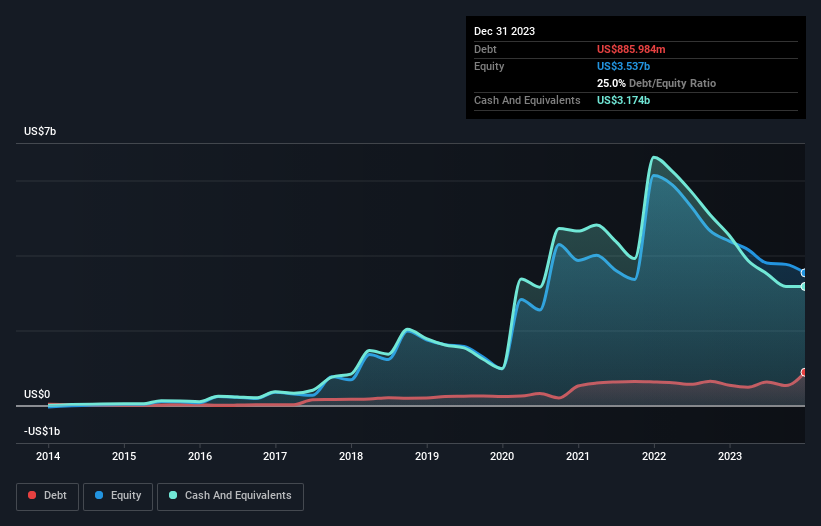
Howard Marks put it nicely when he said that, rather than worrying about share price volatility, 'The possibility of permanent loss is the risk I worry about... and every practical investor I know worries about.' It's only natural to consider a company's balance sheet when you examine how risky it is, since debt is often involved when a business collapses. We can see that BeiGene, Ltd. (NASDAQ:BGNE) does use debt in its business. But is this debt a concern to shareholders?
When Is Debt Dangerous?
Debt assists a business until the business has trouble paying it off, either with new capital or with free cash flow. In the worst case scenario, a company can go bankrupt if it cannot pay its creditors. However, a more usual (but still expensive) situation is where a company must dilute shareholders at a cheap share price simply to get debt under control. Of course, debt can be an important tool in businesses, particularly capital heavy businesses. The first thing to do when considering how much debt a business uses is to look at its cash and debt together.
See our latest analysis for BeiGene
How Much Debt Does BeiGene Carry?
You can click the graphic below for the historical numbers, but it shows that as of December 2023 BeiGene had US$886.0m of debt, an increase on US$538.1m, over one year. But it also has US$3.17b in cash to offset that, meaning it has US$2.29b net cash.

How Strong Is BeiGene's Balance Sheet?
According to the last reported balance sheet, BeiGene had liabilities of US$1.81b due within 12 months, and liabilities of US$457.8m due beyond 12 months. Offsetting this, it had US$3.17b in cash and US$395.9m in receivables that were due within 12 months. So it can boast US$1.30b more liquid assets than total liabilities.
This surplus suggests that BeiGene has a conservative balance sheet, and could probably eliminate its debt without much difficulty. Succinctly put, BeiGene boasts net cash, so it's fair to say it does not have a heavy debt load! The balance sheet is clearly the area to focus on when you are analysing debt. But it is future earnings, more than anything, that will determine BeiGene's ability to maintain a healthy balance sheet going forward. So if you want to see what the professionals think, you might find this free report on analyst profit forecasts to be interesting.
Over 12 months, BeiGene reported revenue of US$2.5b, which is a gain of 74%, although it did not report any earnings before interest and tax. Shareholders probably have their fingers crossed that it can grow its way to profits.
So How Risky Is BeiGene?
Statistically speaking companies that lose money are riskier than those that make money. And we do note that BeiGene had an earnings before interest and tax (EBIT) loss, over the last year. Indeed, in that time it burnt through US$1.8b of cash and made a loss of US$882m. However, it has net cash of US$2.29b, so it has a bit of time before it will need more capital. BeiGene's revenue growth shone bright over the last year, so it may well be in a position to turn a profit in due course. By investing before those profits, shareholders take on more risk in the hope of bigger rewards. There's no doubt that we learn most about debt from the balance sheet. But ultimately, every company can contain risks that exist outside of the balance sheet. For instance, we've identified 1 warning sign for BeiGene that you should be aware of.
At the end of the day, it's often better to focus on companies that are free from net debt. You can access our special list of such companies (all with a track record of profit growth). It's free.
If you're looking to trade BeiGene, open an account with the lowest-cost platform trusted by professionals, Interactive Brokers.
With clients in over 200 countries and territories, and access to 160 markets, IBKR lets you trade stocks, options, futures, forex, bonds and funds from a single integrated account.
Enjoy no hidden fees, no account minimums, and FX conversion rates as low as 0.03%, far better than what most brokers offer.
Sponsored ContentValuation is complex, but we're here to simplify it.
Discover if BeiGene might be undervalued or overvalued with our detailed analysis, featuring fair value estimates, potential risks, dividends, insider trades, and its financial condition.
Access Free AnalysisHave feedback on this article? Concerned about the content? Get in touch with us directly. Alternatively, email editorial-team (at) simplywallst.com.
This article by Simply Wall St is general in nature. We provide commentary based on historical data and analyst forecasts only using an unbiased methodology and our articles are not intended to be financial advice. It does not constitute a recommendation to buy or sell any stock, and does not take account of your objectives, or your financial situation. We aim to bring you long-term focused analysis driven by fundamental data. Note that our analysis may not factor in the latest price-sensitive company announcements or qualitative material. Simply Wall St has no position in any stocks mentioned.
About NasdaqGS:ONC
BeiGene
An oncology company, engages in discovering and developing various treatments for cancer patients in the United States, China, Europe, and internationally.
Very undervalued with high growth potential.


